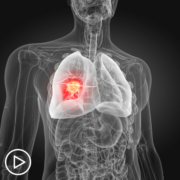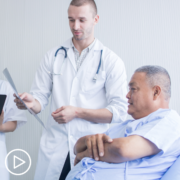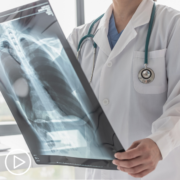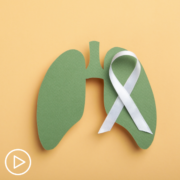Small Cell Lung Cancer Care and Outcomes in Underrepresented Communities
Small Cell Lung Cancer Care and Outcomes in Underrepresented Communities from Patient Empowerment Network on Vimeo.
How does small cell lung cancer (SCLC) care look in underrepresented communities? Dr. Rafael Santana-Davila with the University of Washington School of Medicine explains how health outcomes differ in some ZIP codes and shares advice for questions to ask your doctor to access optimal SCLC care.
[ACT]IVATION TIP
“…patients should ask their doctors, ‘What are the latest advances in this disease? Am I eligible for it to receive those advances? And where can I see a sub-specialist in this disease? And is it a worthwhile point?’”
See More from [ACT]IVATED Small Cell Lung Cancer (SCLC)
Related Resources:

|

|

Key Resources for Small Cell Lung Cancer Patients and Families |
Transcript:
Lisa Hatfield:
Does treating small cell lung cancer patients in underrepresented communities look different than the general population? And are there specific considerations or recommendations SCLC patients from underrepresented communities when it comes to treatment options, including clinical trials or targeted therapies?
Rafael Santana-Davila:
In the majority of cases, patients treated in underrepresented communities do not look different than in the general population in small cell lung cancer. Why? It’s because community oncologists are very good. So they have a hard job, but they’re very good. So the majority of patients get the standard of treatment.
Although we know though that patients with underrepresented communities do fare worse. And we do not know the reasons for that. A lot of that is because of poverty or many other things. I’ve seen people say that one of the main factors that will determine how long you live is what ZIP code you were born in. So underrepresented communities do do worse in general, not specifically for small cell, but in general.
I do think that what we..like we said before is what patients need to do is advocate for themselves and ask their doctors, “Am I eligible for a clinical trial? Am I eligible for what is the latest and greatest for the disease? Any new advances that you see coming?”And like we said before is seek a second opinion with a sub-specialist in the treating of this disease.
So as like we said before in terms of activation, is you need to…patients need to ask their doctors, “What are the latest advances in this disease? Am I eligible for it to receive those advances? And where can I see a sub-specialist in this disease? And is it a worthwhile point?” Many times it may not be an initial diagnosis, but when patients have recurring disease, that’s when clinical trials are really important because that’s where we’re making the most advances in the treatment of small cell lung cancers, when patients have disease that has recurred despite chemo-immunotherapy.
So my activation tip for this is that patients should ask their doctors, “What are the latest developments in the treatment of this lung cancer? And am I eligible to receive those treatments? And is this a time where I should seek a second opinion or be referred to a clinical trial and another center?”
Share Your Feedback:
Create your own user feedback survey






